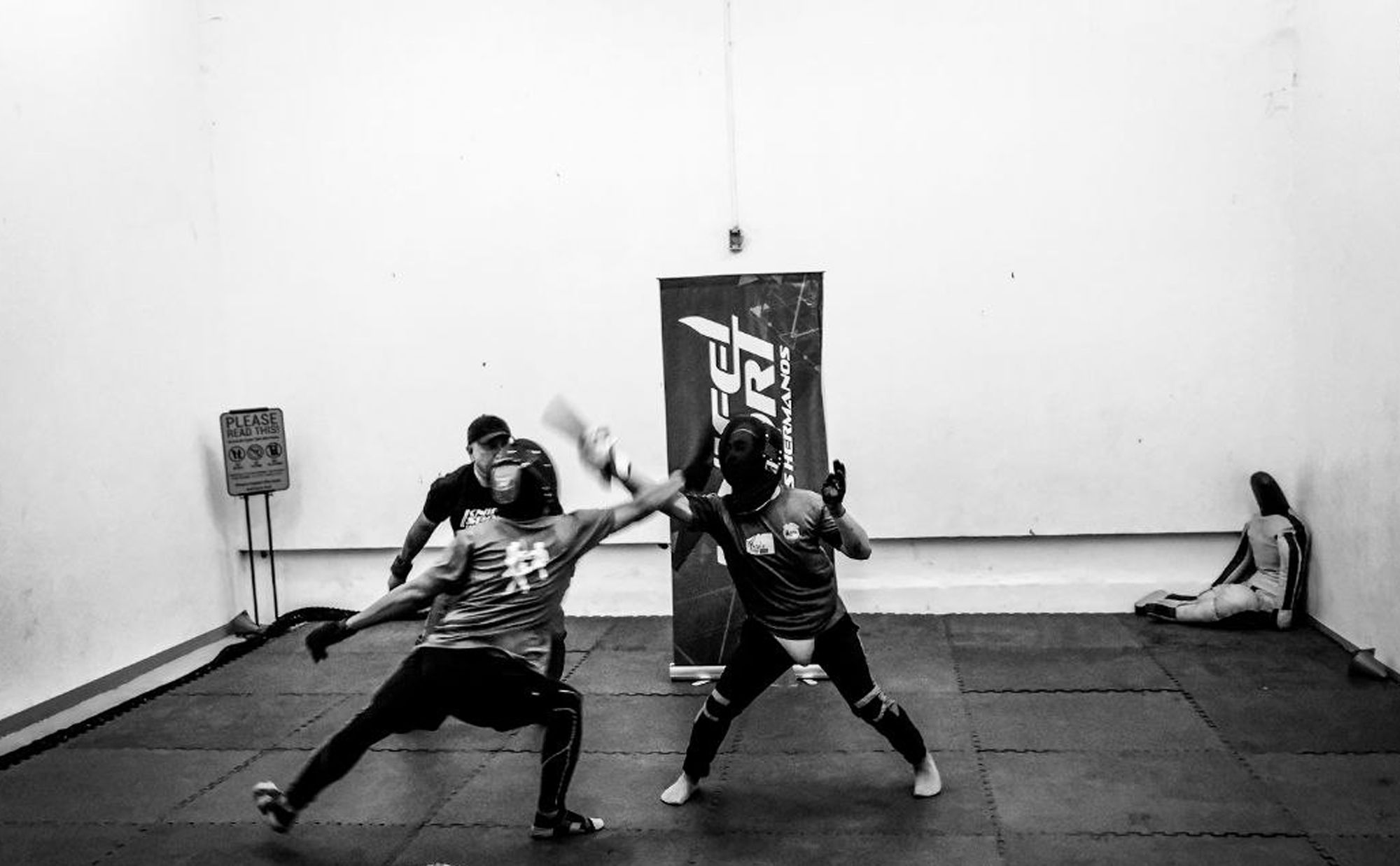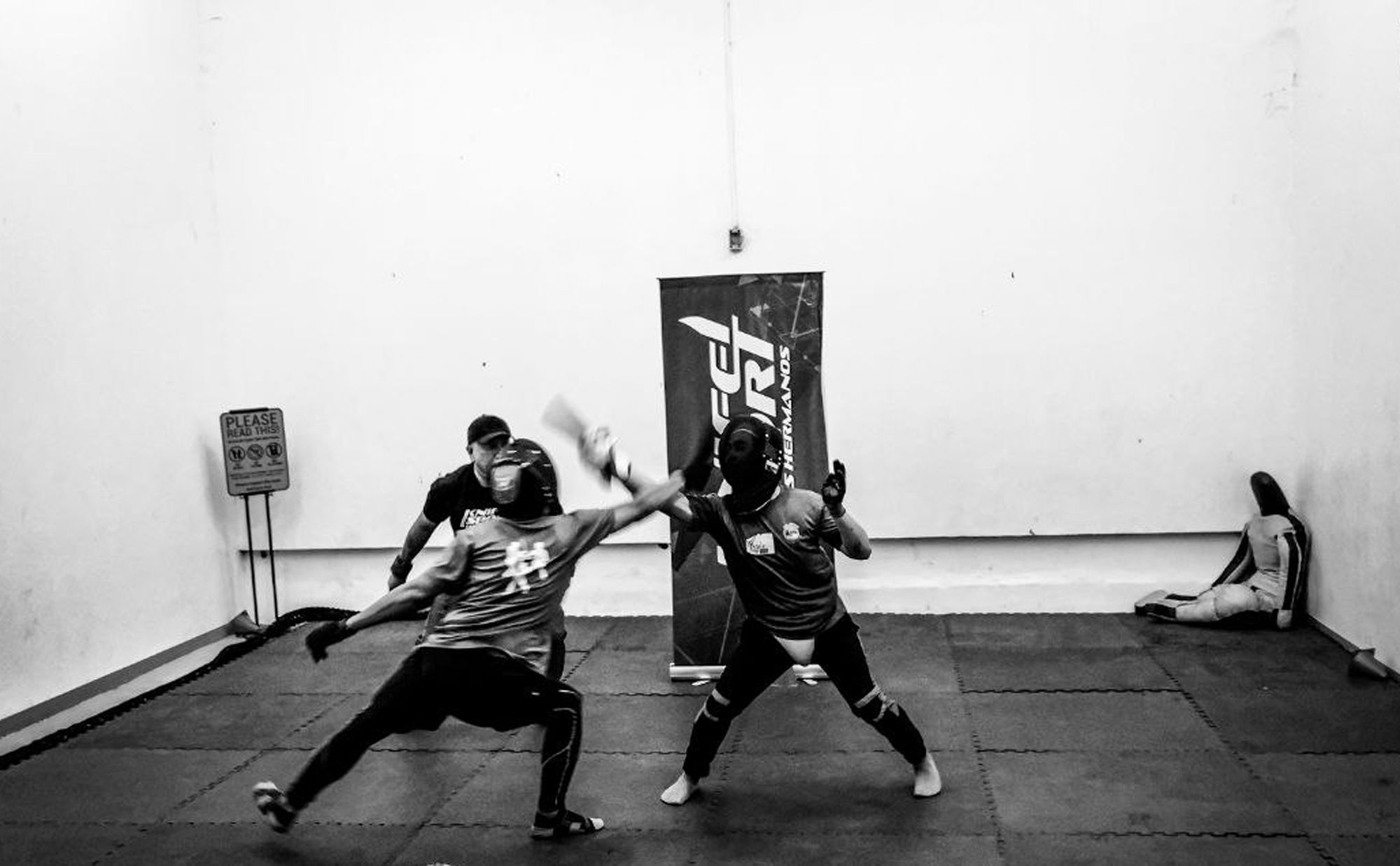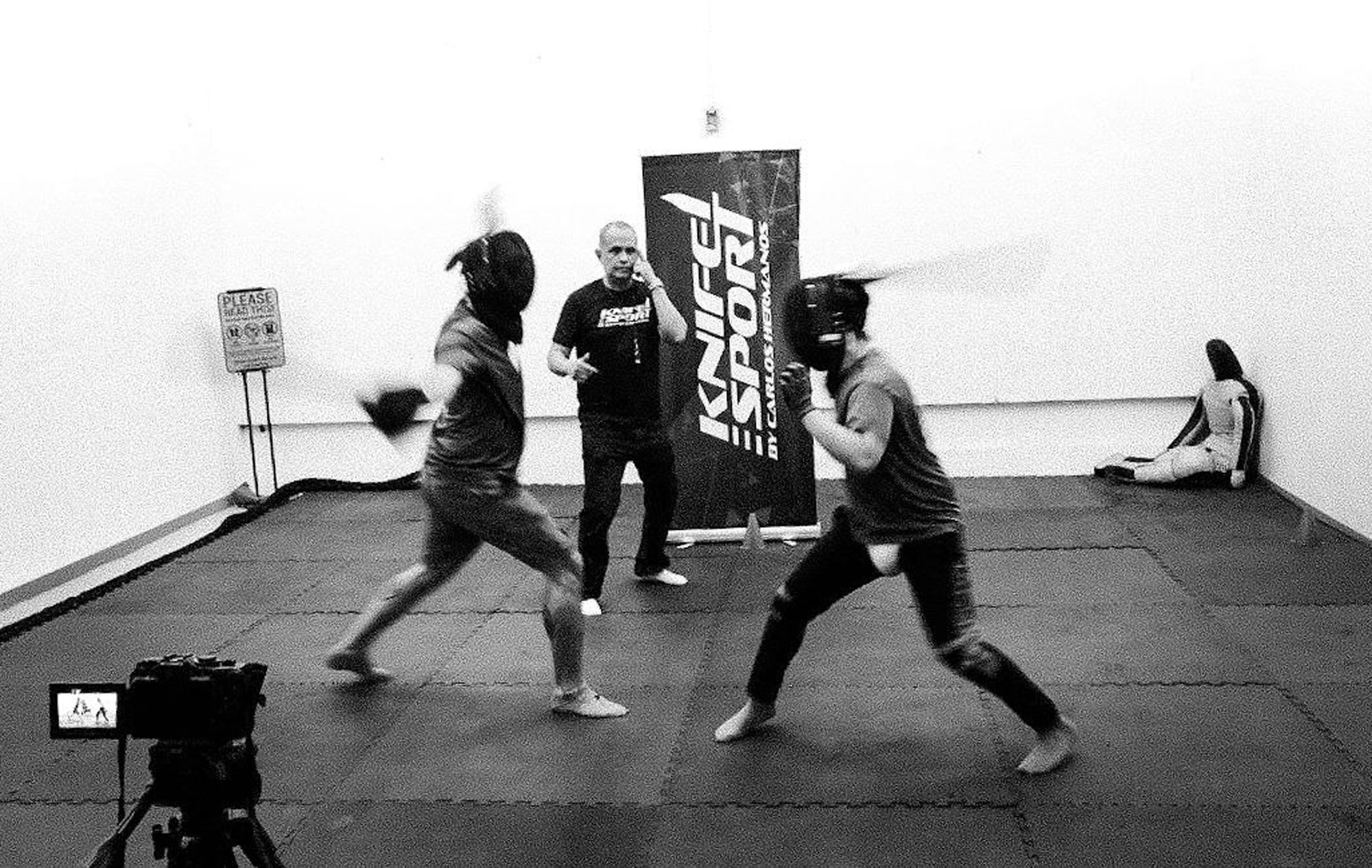KnifeSport by Carlos Hermanos was designed as a fast-paced sporting analog of short weapons combat. It welcomes practitioners of bladed systems who’d like to test their mettle and proficiencies in scored competition.
Using padded wooden sticks and knife-shaped foam wrapped in fabric, they’ve held it in diverse venues like parking lots, household gardens, fitness gyms, and martial arts academies.
The 18th iteration last April 21 was hosted at the Riverside Fight Club inside the Manila Boat Club in Santa Ana, Manila. Winners were awarded medals, certificates, and coveted weapons, both steel and wooden, at the end of the laddered tournament.
“KnifeSport is a fun and engaging event for FMA practitioners like me,” said Pepe Manikan, a musician and KIRO practitioner who competed at KS18. “I like the format since it allows you to play multiple times and test your skill instead of getting knocked out right away. As a 45-year-old, I thought it would be hard on my body, but it wasn’t!”
We talked to two of the men spearheading the event, part of the team of competition organizers; Dr. Sixto Carlos and Ritchie F. Baquirin.
Dr. Carlos is a veterinary medicine doctor by profession and is the CEO of Makati Dog and Cat Hospital. He’s also been a longtime figure in the FMA and knife fighting community of the country, as the co-founder of Carlos Hermanos Kali & Escrima.
His partner in crime is fellow knife enthusiast and weapons practitioner Ritchie Fernandez Baquirin. While he works as a creative director, he’s also one of the folks behind the local chapter of the weighted fitness movement Ruck (PH).

KnifeSport 18 was held at the Manila Boat Club last April 21, 2022. IMAGE BY KARL R. DE MESA
KARL R. DE MESA:Briefly, how did the sport begin and why develop it in this format?
DR. SIXTO CARLOS:A lot of FMA tournaments were a bit disorganized and none really focused on knife fighting, considering the knife is one of the most common weapons martial artists would like to learn. So I decided to form what I call mini-tournaments.
RITCHIE F. BAQUIRIN: This was the brainchild of Doc Sixto. Back in the day Sixto would organize these weapon tournaments using wooden analogs of bladed weapons.
SC: Initially, it was wild! It was full contact, we used short sticks as analogs of knives. People were getting knocked out. Around 2018, I started taking Olympic fencing lessons (saber) along with my kids. I was attracted to the way they organized tournaments. There’s a reason why fencing is the only hand-to-hand weapon sport in the Olympics for over 100 years. My fencing coach guided us how it’s done in fencing. So, the KnifeSport format is based on Olympic fencing. It is not FMA as a lot of people would like to believe.
RB: Those events were pretty wild. Imagine being hit full force with wooden knives and swords! That inspired the current format of KnifeSport with Sixto refining it with a better rule set, scoring, and flow.
SC: We kept it open to sports and systems outside FMA. I believe this is what makes our tournaments successful. By the way, the winner of KnifeSport 1 was my fencing coach! He beat a lot of FMA guys. There was a KnifeSport tournament held during an Olympic fencing event. We invited fencers to join. They dominated the event. The eventual winner of that KnifeSport was a fencer from UP Diliman.
KDM: What was the initial motivation for it?
SC:The motivation behind it was to make people better fast with knife skills. Knife competitions were lacking, so I decided to set up one. Initially my plan was to join the tournaments (which I initially did,) but it’s difficult to be a competitor and organizer at the same time. Currently, I’m an organizer and [an] official. Maybe in the future I can join again?
KDM: There’s a great argument for martial artists—especially combat sports practitioners—to compete every so often and test how well they can apply what they’ve learned.
SC: Competitions do up your game, it speeds up your gains in skill. You also get exposed to other fighters. We also have to tell the competitors “this is a sport”…hence KnifeSport. Before there were so much debate that this technique won’t work, this other one is effective, and whatever else. It all ended up in debate.
So we simplified everything, including the scoring method. At least in KS, certain of your attributes like speed, timing, fight IQ can be tested. Real knife fighting is different. That’s a life or death thing. It’s difficult to replicate in competition format and would be impossible to score. To say KS is what reality is would be a lie.
KDM: In its current format, was this how you envisioned the sport evolving?
RB: For me, initially, it was a way to provide knife practitioners a venue to practice their skills or express their martial arts. Now, in its current form, we aim to make this into a formal sport with elements from FMA competitions and Olympic fencing, open to anyone.
KDM: How hard was it initially to organize and execute?
SC: The first tournament was at my mother’s garden and most competitors were students. Luckily, there was an interest for members from different clubs to join.
KDM: Sounds like it was challenging to get off the ground.
RB: As with all comps—specifically very niche comps like ours—it was a challenge to make people understand what it was. “Why would you join something like this?” was always a question we would ask ourselves. Also differentiating us from other comps was an initial challenge. But not anymore.
KDM: The round robin format, the fast pace of matches, and the ability to fight plenty of times through the day have proven to be very attractive and (comparative to other stick and knife comps) unique selling points to competitors.
SB: The round robin format or pooling came from Olympic fencing. Competitors love it! In other competitions once you lose, that’s it! In KnifeSport, you get to fight at least 3 to 4 times. If you reach the finals, you get to fight more. Making the rounds short (30 seconds for regular fights, 60 seconds for the finals) replicates real knife fights.
RB: Yes, our current format is the first of its kind considering we blended elements of Olympic Fencing and FMA. But I want to make this clear though—we are NOT a system nor are we FMA. We are a non-aligned competition open to all types of competitors. Anyone can play, even if you are not a martial artist. We implemented the current ruleset since KnifeSport 2.
KDM: In the hand spar (hand and wrist hits-only) and knife divisions, what kind of players do you find excel?
SB: I guess it’s the guys who realize this is a competition. For years the problem in FMA has been “my master is better than your master.” Well, train and test what your master has been teaching you!
RB: The most competitive players are the ones with the most balanced attributes of speed, explosiveness, training and of course physical attributes. But there are outliers, several of them. I’ve seen competitors who are not physically conditioned, yet very cerebral, with high fight IQs. Some competitors are speed demons who off the bat will come at you. My point is, different types of people with different backgrounds added make into a unique mix.
KDM: Thoughts on eventually organizing competitors by weight divisions?
SC: Maybe in the future when there are more competitors, we may add age divisions, similar to Olympic fencing tournaments. Weight division? Right now I don’t think so. It’s nice to see small guys fight big guys, heavy set compete against light guys. It simulates real fights. You don’t know who you will be fighting.
RB: The fights are more interesting and less predictable without weight divisions. Compare it to a comp where everyone has FMA training—you’ll see same techniques. For me not very interesting. Imagine though a fencer going up against an FMA practitioner—or a Krav Maga guy vs a judoka—you can’t really say who will do better right? It’s just more interesting. By keeping it an “open” comp, we want to attract anyone who is game.

KnifeSports was conceptualized to give people a venue to test and improve their knife skills–something that is currently lacking in the Philippines. IMAGE BY KARL R. DE MESA
KDM: Looking back at the first event, did you guys think it would be as well received as it is now?
SC: I thought only people I know personally would join. We’ve had 18 KS tourneys so far, not counting the original knife sparring tournaments which we had with our Duelo tournaments before (sparring with long sticks, analogs of swords). I am surprised that people have heard about it and join.
RB: When you go into these things (organizing sports events)—you are the optimist—of course you want to do well. But Sixto has always had a growth mindset—something common between us. We both knew it would do well, but to get there we need to do several iterations. So every comp from KnifeSport 1 to 18 was a learning process, each one a new evolution.
SC: I am delighted that it is very well received and people have been posting about KS on social media. All the while my plan was just to have a lot of backyard events. You have to thank Ritchie and (his partner) Ems for the traction KS has today. It’s all because of them!
RB: Personally, I keep myself in check. I always think “it’s never good enough” and I still think we can do better. So that fuels innovation. Like the saying goes, there are no winners or losers, only lessons learned.
KDM: Moving forward, how do you see the sport growing after KS18?
RB: I actually do not care about other weapons based comps, in fact having more of these will be great for the weapons fighting and martial arts community. Personally I would like to not just do well in those categories. I want KnifeSport to be a legitimate professional sport with players, like a league, with players from different countries.
SC: I take it a day at a time. It’s quite tiring to organize events.
RB: It will be a slow crawl still to get the support that traditional sports enjoy. Like with anything we have yearly plans, and a 5-year plan. But in a nutshell, at least 4 competitions in a year, ramping up to an additional 2 per year. KnifeSport comps aren’t just about the players, they’re also for the people who come with the competitors; their supporters. Every comp is like a reunion and an opportunity to exchange ideas, enjoy each other’s company—that is also a growth metric.
KDM: Any message to potential KS competitors who might still be on the fence about joining?
SC: Just join! You get better every time you join. It’s very safe and as much as possible we try to keep the ego of everyone in check. At the beginning of each event we tell people “Learn and have fun.”
RB: If you are reading this, it’s hard to just be convinced just by words. Try it. Join us for KnifeSport 19 and future competitions—it will change your perspective.



